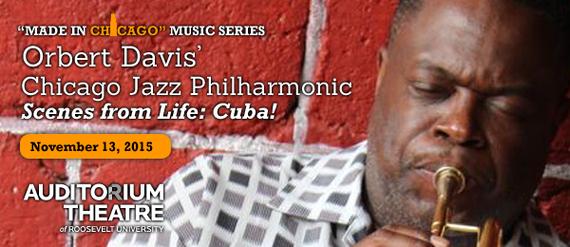Orbert Davis reprises his symphonic jazz work, first performed at the Havana International Jazz Festival in December 2014, in Chicago at the Auditorium Theatre on November 13, 2015. Featured guest artists will include student musicians from Cuba's national conservatory of the arts, the Universidad de las Artes (ISA), who will join Chicago Jazz Philharmonic (CJP) for the occasion. Orbert and members of CJP were rehearsing with the students of ISA in Cuba during the historic announcement of the normalization of diplomatic relations between the U.S. and Cuba, thrusting Davis and company into the spotlight of national news on "60 Minutes."
To be anywhere near trumpeter and composer Orbert Davis these past couple of years is to hear the word "Cuba" over and over again. It is the verbal thread that weaves from conversation to conversation, rehearsal to rehearsal, performance to performance.
That one word, Cuba, turns into many words. Those many words turn into stories, and those stories into musical notes, notes that I have performed over and over again as violist with my beloved CJP and now have running through my brain on a near-constant loop. You don't just learn Orbert's music; you absorb it and then it absorbs you in return.
That one word, Cuba, also turns into people I now know on a first-name basis. People like Orlando and his "walk" that is a key part of Havana Blue, the suite Orbert composed after his first trip to Cuba in 2012.
I've not actually met Orlando in person because I haven't been to Cuba--yet. (Somehow, Orbert forgot the part about violists being natural ambassadors of the musical and geopolitical world--strange, I know; under the duress of my heavy viola case, he now understands.) When I finally do get to meet Orlando in person, it will seem like just a formality since Orbert has already introduced us all to him in his compositions.
So I also know all about El Malecon, the seawall promenade along Cuba's coast. I know what it looks like, how it feels and how it sounds: all because Orbert was there on the Malecon, internalized his experience and put it onto paper for me and the rest of the Chicago Jazz Philharmonic to perform as part of his Havana Blue. Playing the gorgeous solo viola line in that piece took me right to Cuba, where I stood on the promenade next to Orbert, if only in my mind.
To know Orbert is to trust him, to love him and to love his music; there is no separation between the man and his music. Hearing and loving his music gives you a glimpse into his mind and his heart. His music bridges gaps between instrumentalists, making us classical musicians swing and the jazz musicians straighten up and fly right.
His music also bridges gaps between genres, using both classical and jazz forms to produce the most amazing, new musical mode that I've ever heard or played, called Third Stream. And now, Orbert and his orchestra, the Chicago Jazz Philharmonic, are bridging gaps between once feuding nations. Orbert's music gives audiences a backstage pass to musical history in the making.
When Orbert and my colleagues left for Cuba (without me, are you getting this yet?), I watched and pined away back in Chicago. I followed on Facebook, email and text, chewing my viola fingertips in jealousy (always the rhythm section! Those guys get everything!) as I watched from afar. When President Obama made his announcement on December 17, 2014 about ending our embargo with Cuba, it somehow made perfect sense that Orbert and the CJP would be right there in the thick of things while history unfolded before the world.
Of course he would be there when the 60 Minutes crew arrived in Havana. Of course this is how it would happen. I don't know how to explain it other than somehow, on a deep cellular level, it just makes sense that Orbert, his music and the CJP are in the vicinity when walls come crumbling down, when barriers are broken, when peace is being brokered.
To be in the Chicago Jazz Philharmonic and near Orbert is to see a beautiful thread up close, its color and texture unlike anything you've ever seen before. And you know, you completely understand, that this thread is a part of a much bigger tapestry. You witness this thread spanning continents, the globe, musical genres, audiences and musicians alike and you are in awe. Orbert sees (and more obviously, hears) the Big Picture; he's playing a game of musical chess and is several moves ahead of everyone else. He comprehends the long game and the Chicago Jazz Philharmonic's place in it.
To hear Orbert's compositions about Cuba, being performed by the CJP and musicians from Cuba playing together, is to fully understand how music is used as a universal language. A language that somehow needs no translation between cultures or countries.
Do you hear how big this music is? It's bigger than me, than you, than us. It's bigger than Chicago or Havana. It's bigger than embargos, bigger than politics, bigger than politicians. It's the sound of humanity evolving and moving forward, and I feel like the luckiest violist in the whole world to have a front row seat. Sit back with me, relax and enjoy the ride.
History will be made again as Orbert Davis' Chicago Jazz Philharmonic performs the U.S. Premier of Scenes From Life: Cuba! on November 13, 2015 at the Auditorium Theatre in Chicago. Tickets can be purchased by clicking here.

